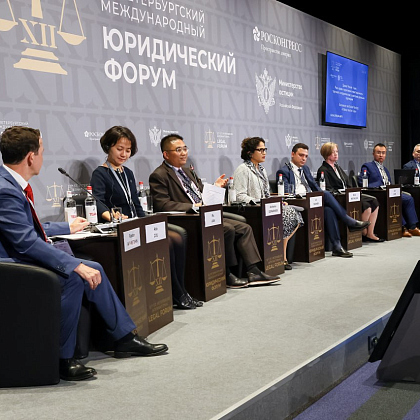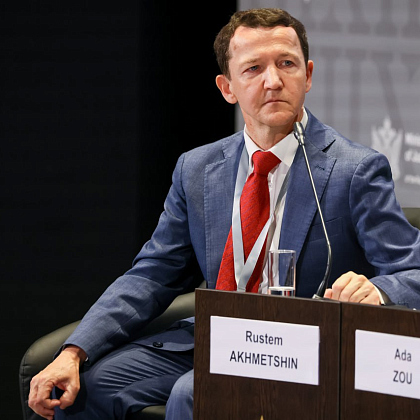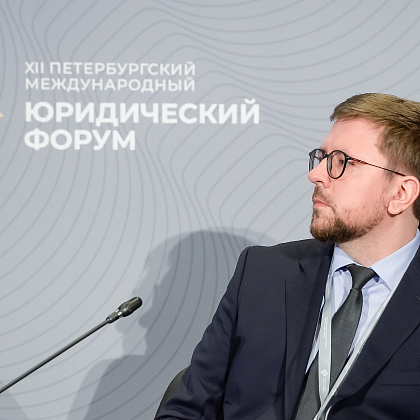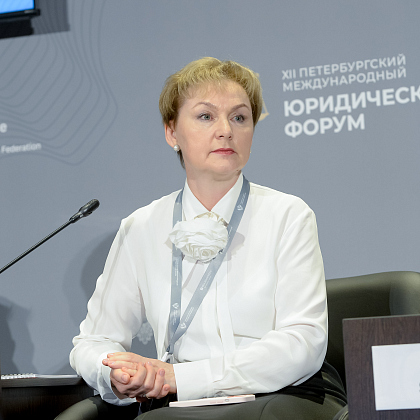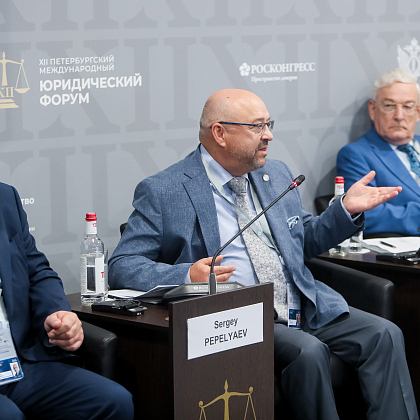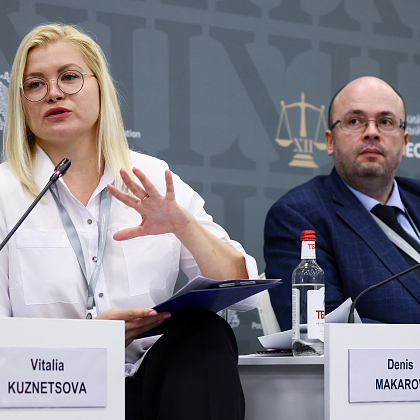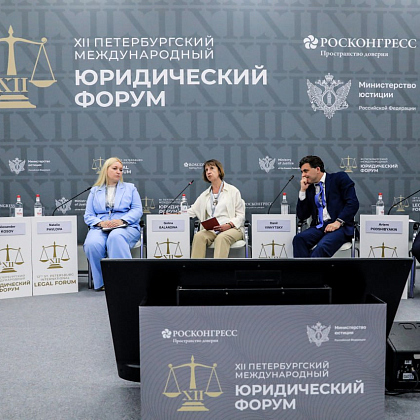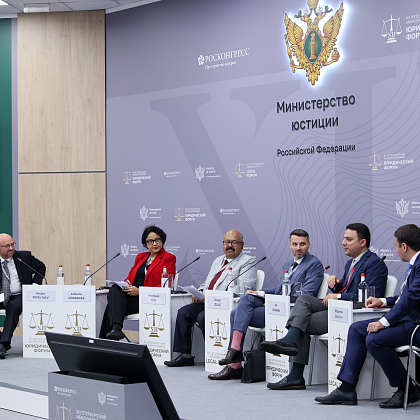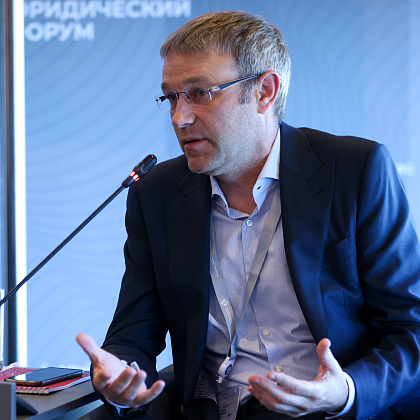Pepeliaev Group at the XII St Petersburg International Legal Forum
Experts from Pepeliaev Group have played an active part in the XII St Petersburg International Legal Forum, which took place between 26 and 28 June in St Petersburg. Partners at and heads of practice areas in the firm spoke at 12 sessions, and moderated three of those.
26 June
On the first day of the forum, Konstantin Sharlovsky, a Partner at Pepeliaev Group, participated in the session titled “Law and Bioethics”. The participants discussed the role of law and how the system for regulating genetic technologies could be modernised. Ethics and morality should precede the legal regulation of research and fill it with the appropriate content; otherwise there is the risk of running into an ever-changing legal position that justifies or prohibits any scientific research.
Please follow this link for a broadcast of the session
Partner Alexander Kosov moderated the session “Customs Know-How in Relation to Replenishing the Public Coffers”. The participants discussed the growing trend in the practice of customs authorities to assess customs payments on dividends. This is a unique practice for which there is no precedent in any country throughout the world. It is disturbing not only from the standpoint of the still ongoing task of creating a favourable investment climate, but also from the perspective of the long-term tax implications. Given that the position of the Russian Supreme Court’s Judicial Panel with regard to dividends is contradictory, customs authorities and foreign trade participants interpret it differently. This prevents the law from being uniformly applied.
Please follow this link for a broadcast of the session
Managing Partner Sergey Pepeliaev took part in the session “Professionalisation of Legal Aid: ‘Homework’ Inspired by the 11th Forum”, which stemmed from the session “Legal Services Market and Legal Representation” at last year’s legal forum. A year ago, the majority of the participants in the session agreed that only someone with the status of an attorney-at-law (certified to represent clients in criminal cases) should be entitled to provide legal services. The participants in the current session discussed the amendments proposed by the Russian Ministry of Justice, including the availability of legal services, the creation of new forms of associations for attorneys-at-law, and opportunities for attorneys-at-law to work under employment contracts. They also outlined key points that need to be taken into account when amendments are drafted.
Please follow this link for the broadcast of the session
Partner Yulia Litovtseva took part in the session “Bankruptcy 2024: New Trends”. The current year stands out for the number of new legal positions in the area of bankruptcy: Russian courts being granted jurisdiction over the bankruptcy of foreign companies, adjustments to the system for redistributing the tax burden for an insolvent bankrupt, new insolvency thresholds proposed by the legislature, and the unification of procedural rules for the consideration of separate disputes in bankruptcy cases. The participants discussed in what cases the bankruptcy of a non-resident company’s estate in the Russian Federation is permissible, how to find a compromise between the fiscal interests of the governing body and the claims of bankruptcy creditors, and much more.
Please follow this link for a broadcast of the session
Senior Partner Rustem Ahmetshin moderated the session “Russia–Asia Dialogue: The role of Law in Strengthening Investment and Trade Cooperation with Business Partners in Asia”. Representatives of the legal business from China, India, Iran, Uzbekistan, and Russia shared the experience of other countries, and discussed issues around promoting and safeguarding foreign investments and cross-border trade. Among the issues that the participants discussed were the legal regulation of investment and commercial partnerships with Asian countries, as well as preferences and benefits for foreign investors, interaction between banking systems, and legal guarantees for foreign business.
Please follow this
link for a broadcast of the session
27 June
On the second day of the forum, Managing Partner Sergey Pepeliaev took part in the session “Professional Risks in Legal Practice”. There are certain risks inherent in advocacy, including the risk of criminal prosecution as a way of putting pressure on the opposing counsel in court proceedings. The risks and threats that counsel may face depend on the nature of the cases they handle, as well as their specific actions in a particular case. The lack of the appropriate mechanisms to protect attorneys-at-law cannot help but have an adverse impact on the quality of advocacy. The participants of the session discussed the main risks inherent in advocacy and the ways of minimising them.
Please follow this link for a broadcast of the session
Expert Sergey Taut participated in the session “Tackling Corruption”. The participants in the discussion noted that anti-corruption compliance drives economic growth. During the session they discussed the anti-corruption practices of CIS countries and confirmed that business needs to develop systematic approaches to counteracting corruption. Recommendations were also voiced that anti-corruption measures must be introduced.
Please follow this
link for a broadcast of the session
28 June
On the third day of the forum, Head of the Employment and Migration Law Practice Group Vitalia Kuznetsova participated in the session “Labour Disputes”. A balance of the interests of an employee and employer may be ensured by using various legal mechanisms including mechanisms for examining and resolving legal disputes that are far from being ideal at present from both the theoretical and practical points of view. Participants in the discussion attempted to answer the questions of whether the employee is always the weak party to an employment relationship; and how pre-judicial, extra-judicial and judicial procedures for examining and resolving employment disputes correlate in terms of whether they are effective in safeguarding the rights and legal interests of parties to employment relationships.
Please follow this link for a broadcast of the session
Sergey Spasennov, Senior Partner and Head of the St Petersburg Office, took part in the session “Between a Rock and a Hard Place: Ways for International Companies to Continue Doing Business in Russia in the face of Foreign Sanctions and Russian Countermeasures”. The pressure of foreign states’ sanctions on Russia has ratcheted up, while in Russia, these sanctions are not recognised as lawful and state authorities take a dim view of compliance with them. In addition, Russia has introduced a number of retaliatory countermeasures that significantly limit transactions and operations. The situation is a major challenge for international companies that continue to operate in Russia, as well as for prominent Russian companies operating abroad. The participants discussed how companies have found themselves between a rock and a hard place and whether it is possible to continue doing business under these conditions.
Please follow this link for a broadcast of the session
Partner Valentina Orlova took part in the session “Intellectual Property Law in the 21st Century”. Unlocking the potential of intellectual property requires legal regulation in this field that would take into account the development of new technologies and industries, as well as new challenges in economics and geopolitics. The participants discussed current trends in the development of intellectual property law in the 21st century, how the active use of artificial intelligence is affecting this area, as well as the specifics of protecting intellectual property in creative industries.
Please follow this link for a broadcast of the session
Partner Alexander Kosov also participated in the session “Customs Disputes: Identifying the Key to Success in Court”. Although the member states of the Eurasian Economic Union have transferred customs regulation to the level of the Union, disputes involving customs authorities of these states are considered by national courts applying state procedural codes based on sometimes differing approaches to various issues of substantive customs law. The participants discussed the difficulties that businessmen encounter during the customs clearance of goods and in protecting their own rights, the specifics of challenging the classification of goods and its influence on customs value, as well as the approaches of the EAEU Court, whose acts are called on to ensure the unified enforcement of customs law across the customs territory of the "Eurasian Five" countries.
Please follow this link for a broadcast of the session
Managing Partner Sergey Pepeliaev moderated the session “Legal Assistance in the BRICS Countries: Legal Infrastructure for Mutual Investments”. Trade and economic interaction with the BRICS countries is continuing to grow stronger. In this situation, one of the government’s top priorities is to improve legal mechanisms that aim to regulate business relations with BRICS partners and ensure the safety of foreign investments, since this directly affects the economic security of the Russian state. The participants discussed how the legal mechanisms that are used to regulate business relations between the BRICS countries are changing and what can be done to improve them.
Please follow this
link for a broadcast of the session
29 June
On Saturday 29 June, Senior Partner Sergey Spasennov and Partner Ksenia Litvinova spoke at the International Youth Legal Forum in the sessions “Legal Education: Bachelor's Degree, Master's Degree, or Specialisation?” and “Modern International Taxation in BRICS+ Countries”.
Photo: Roscongress Fund

